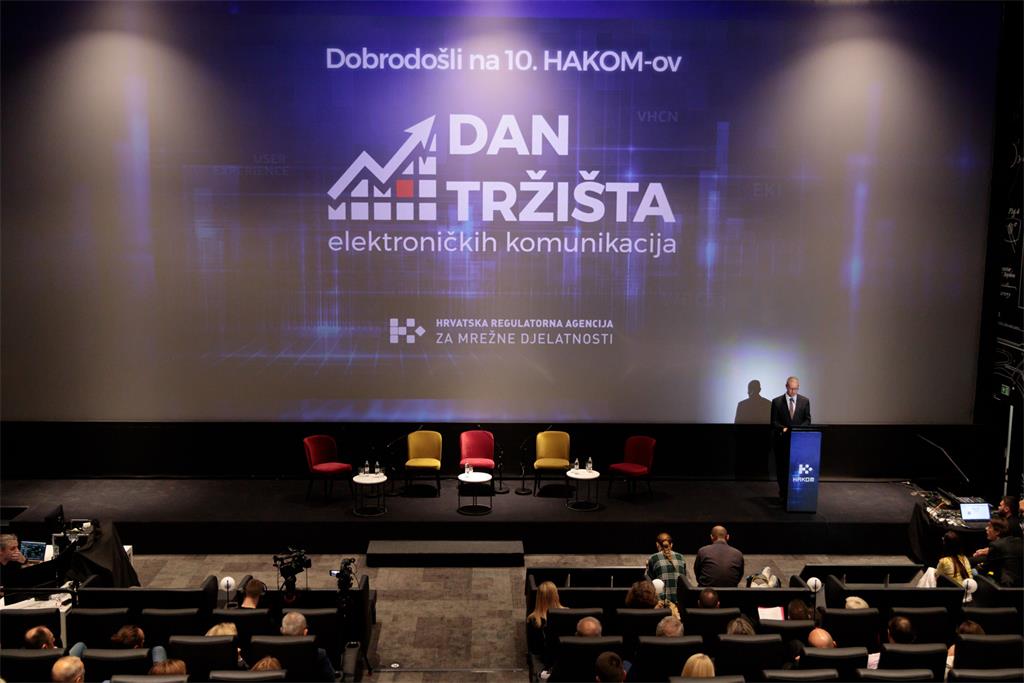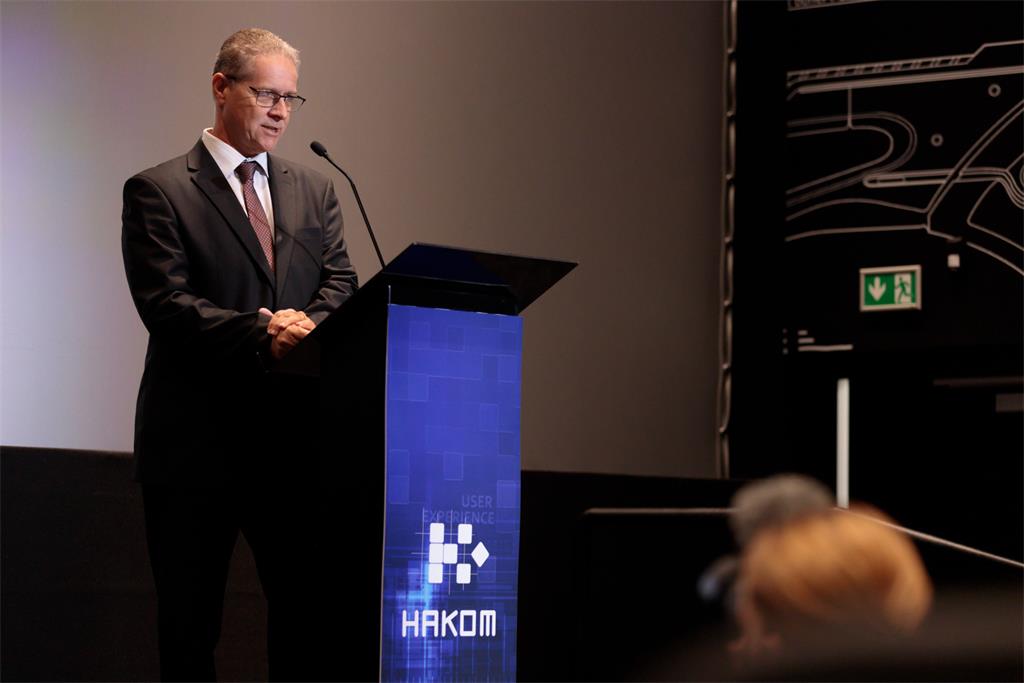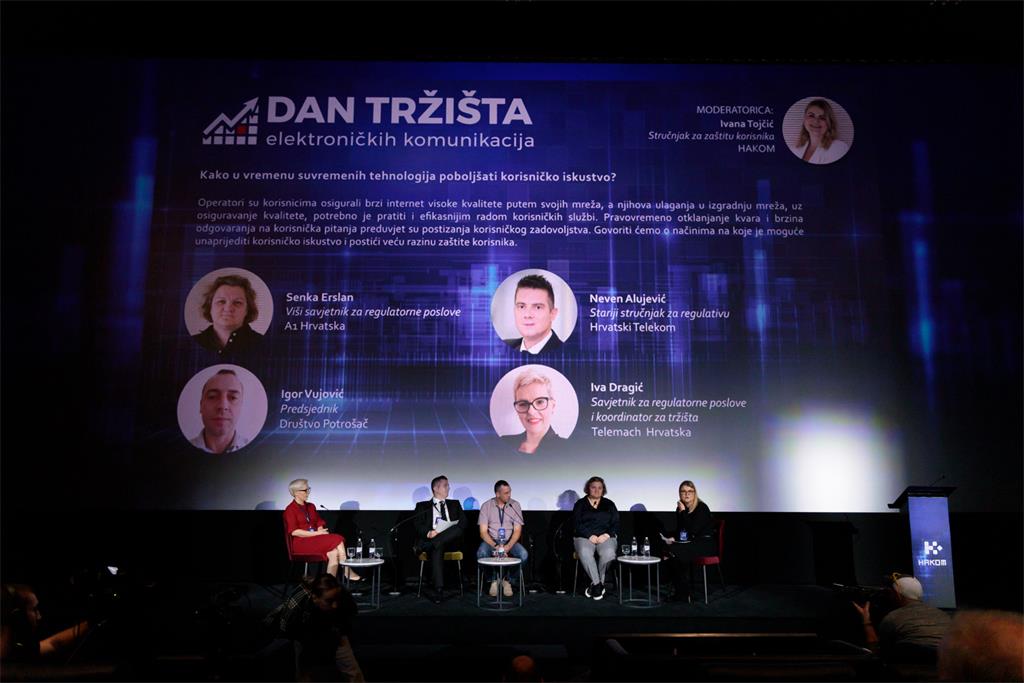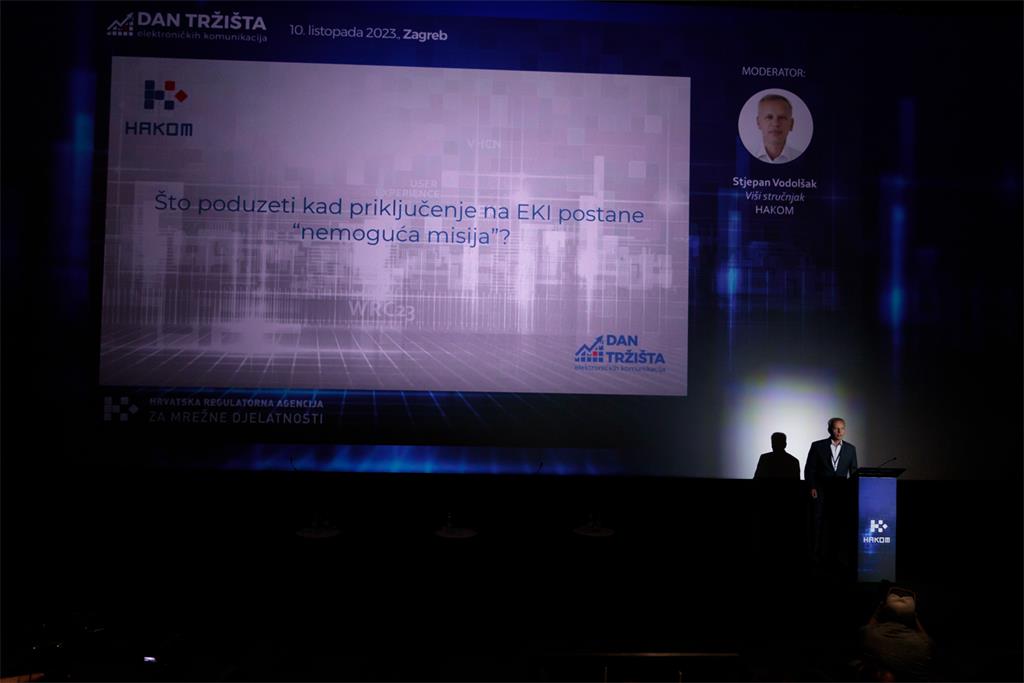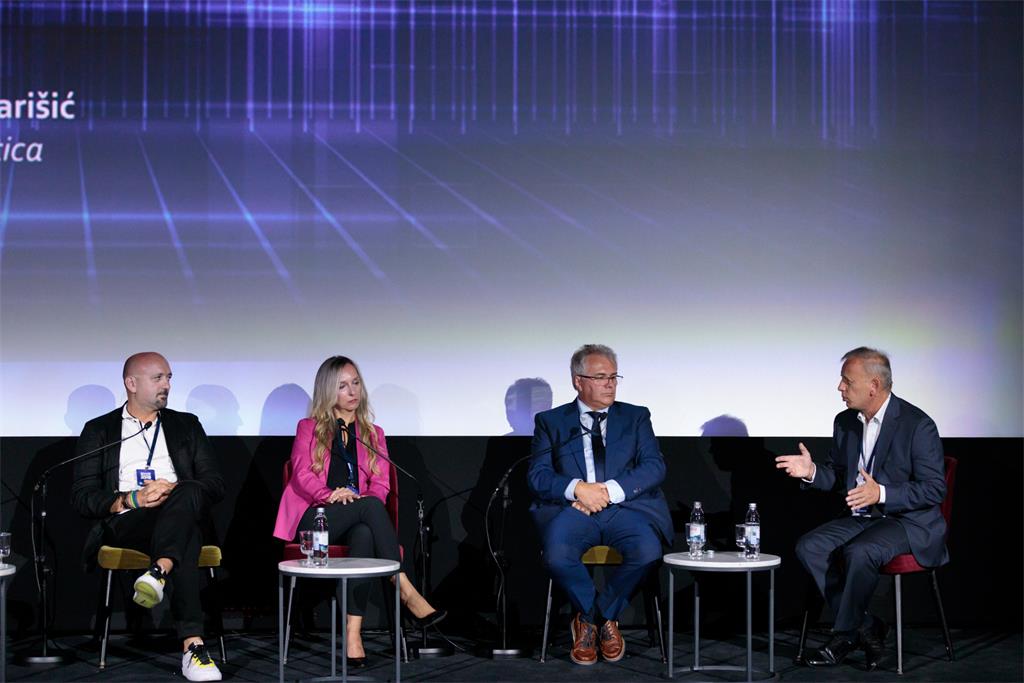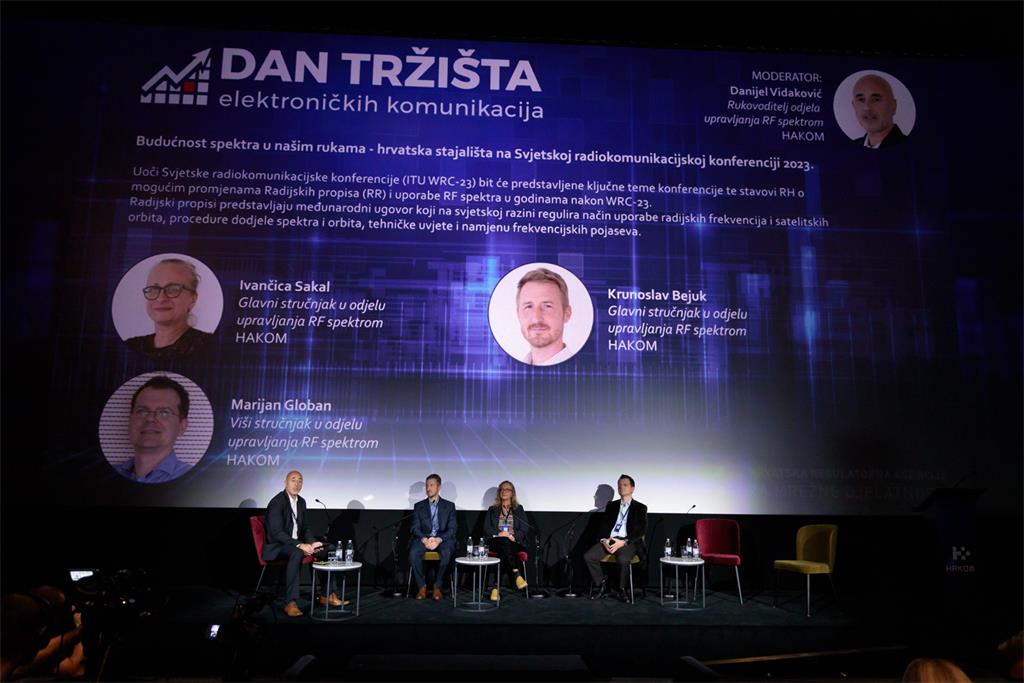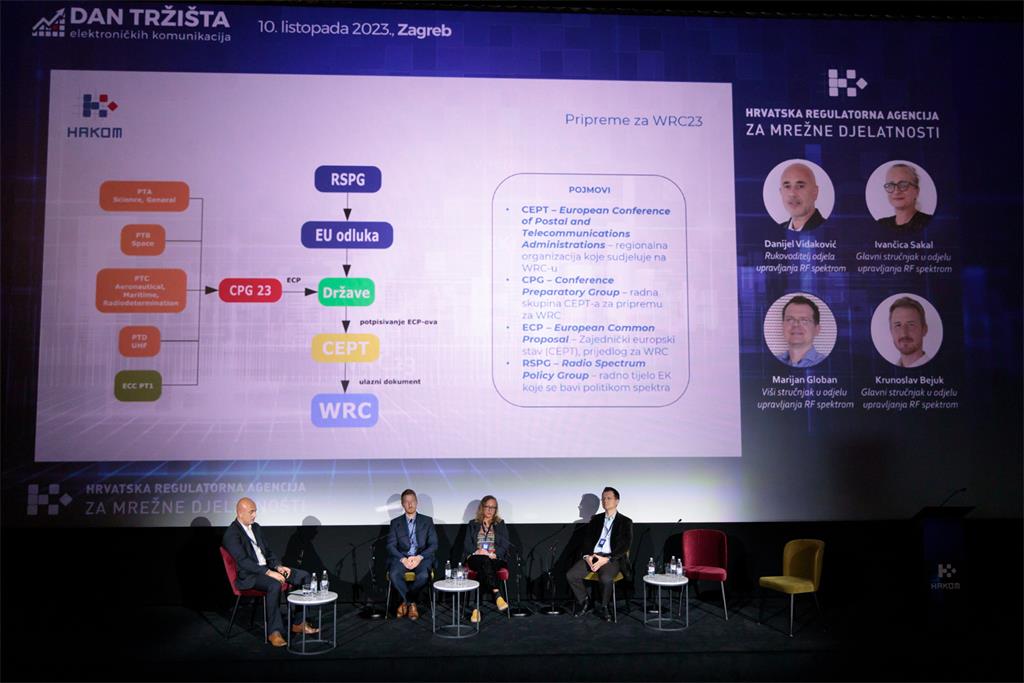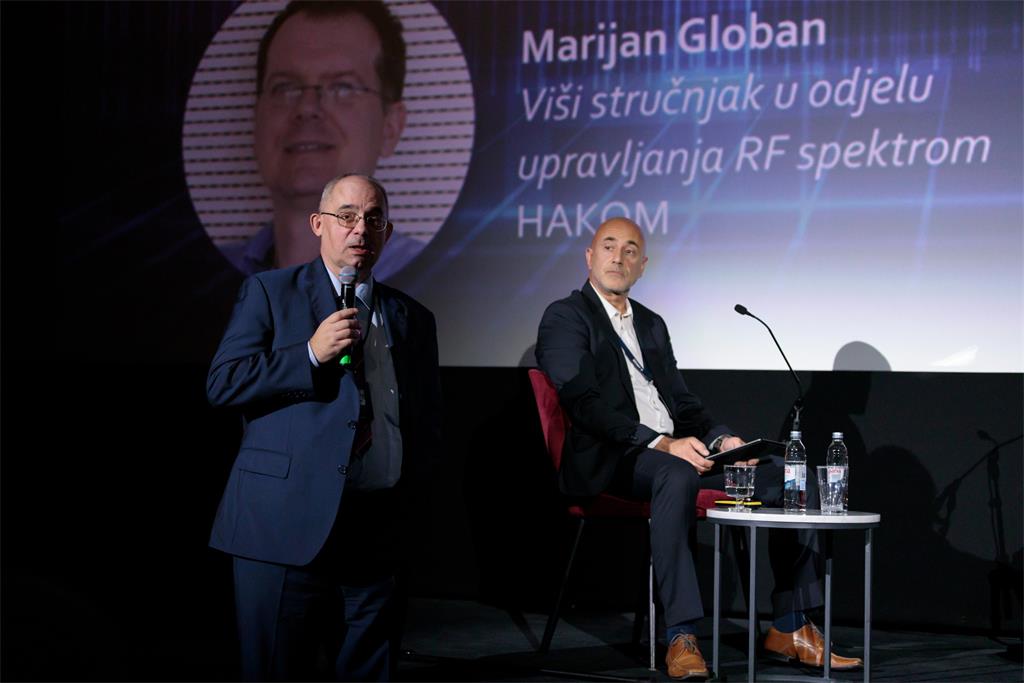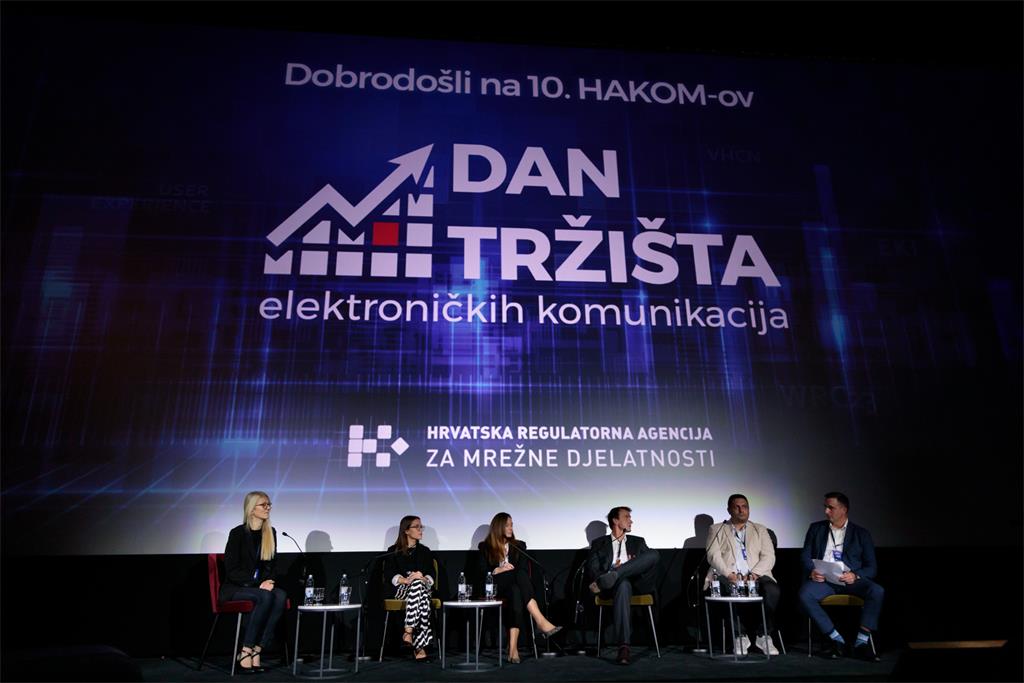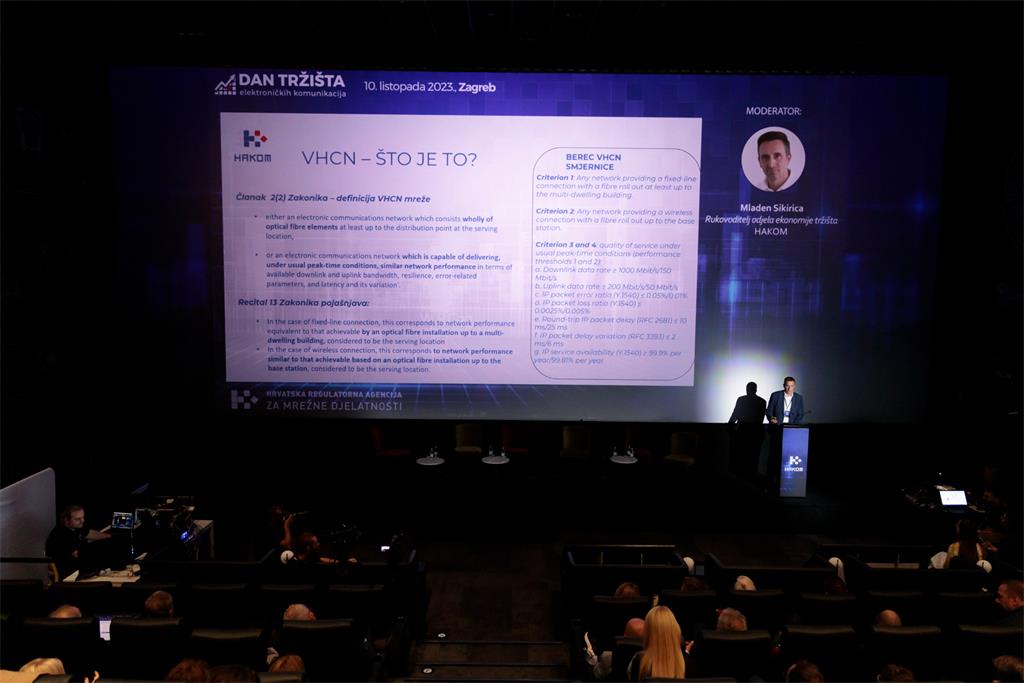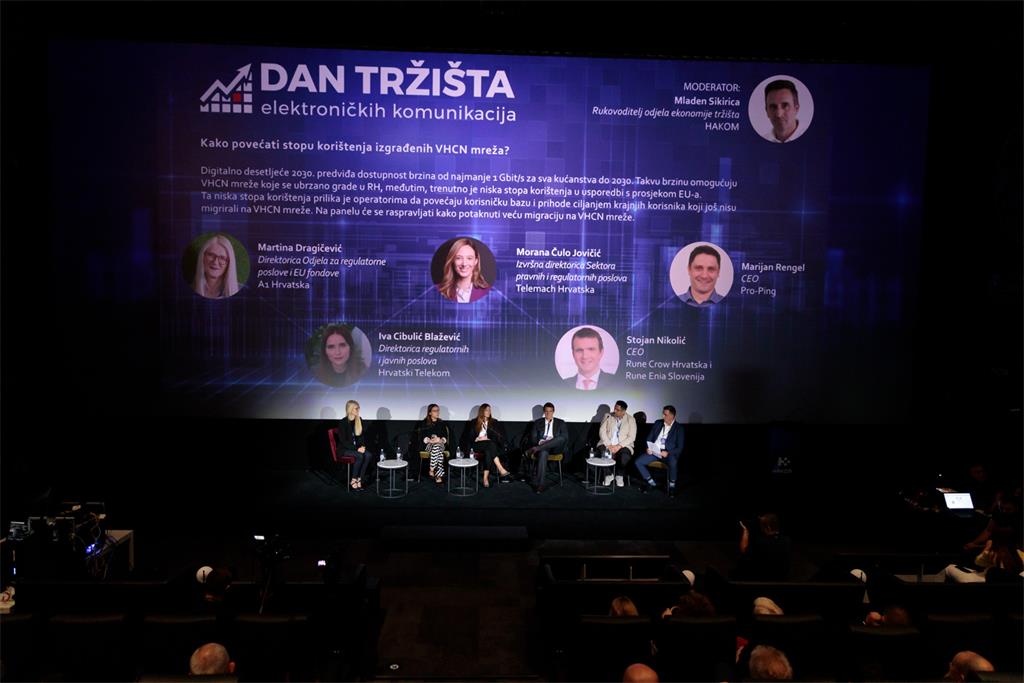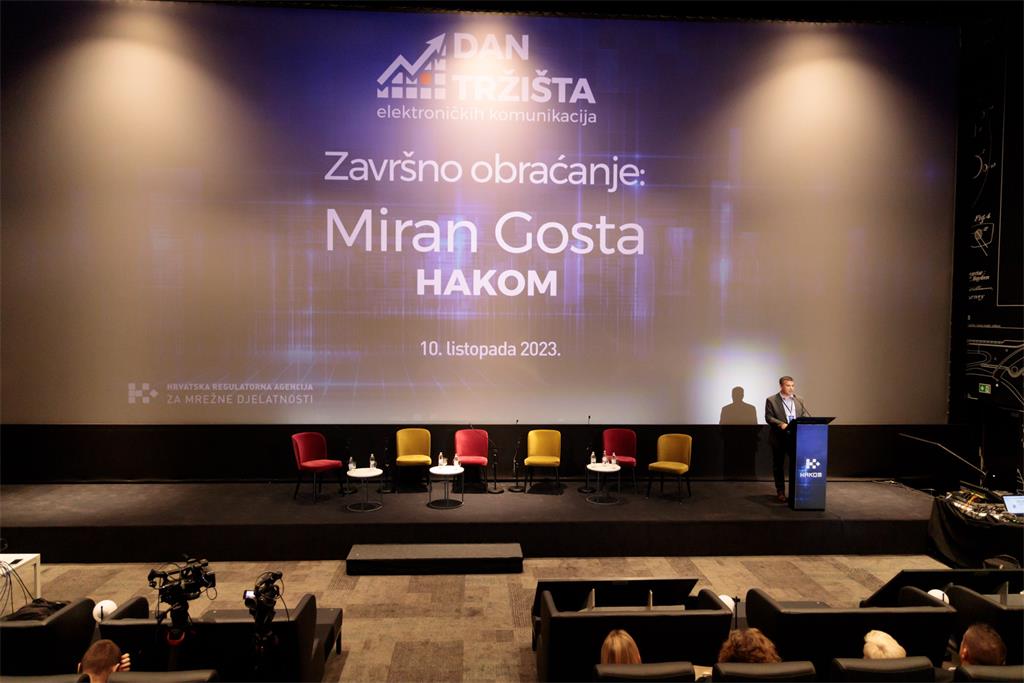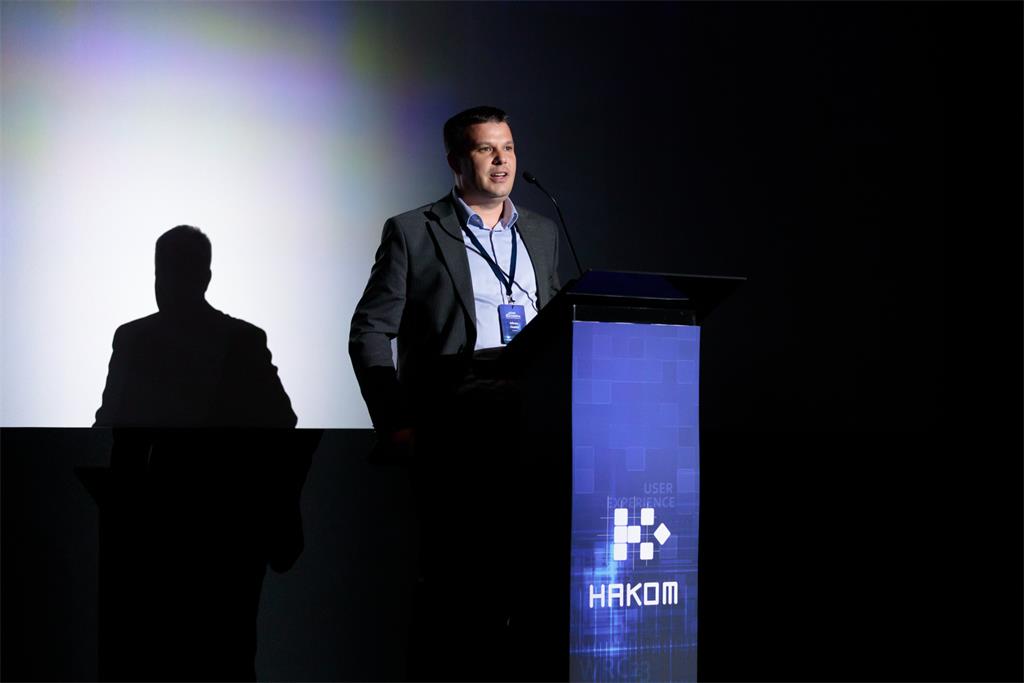HAKOM’s 10th. Electronic Communications Market Day
Zagreb, 10 October 2023- HAKOM’s 10th, Electronic Communications Market Day was held on Tuesday in Zagreb and gathered numerous experts, representatives of the stakeholders of the electronic communications market, state administration bodies, the economy, the scientific community and the media. This year’s conference focused on four completely different topics, and besides the user rights and obligations of operators, the possibilities of connecting to electronic communications infrastructure, the future of radio spectrum and how to encourage greater migration to VHCN networks were discussed. Tonko Obuljen, President of the Council at HAKOM, who will also chair BEREC’s umbrella organisation of European electronic communications regulators next year, presented the most important activities on the market and the objectives and tasks of HAKOM in the future. He pointed out that the previous year was challenging and fulfilled by numerous regulatory decisions, and after the entry into force of the new ZEK last year HAKOM adopted 15 new or amended regulations and six more are under preparation. Among other things, the database of transferred numbers was improved, HAKOMetar and the application for e-licences were upgraded, and the number of user disputes was reduced. Thanks to the latter, HAKOM’s experts left more time to educate users. In the coming period, the promotion of the rights of persons with disabilities will continue, and HAKOM has been extended in this segment in accordance with the Accessibility Act. The construction of networks co-financed by EU funds is coming to an end, said the President of the Council at HAKOM , pointing out that as a society we are not sufficiently aware that without the deployment of networks there is insufficient progress and that we are still facing obstacles to construction. In the coming year, an analysis of the quality of universal services will be carried out, and thanks to the successful public auction process at national and regional level, the conditions for further development of 5G and private networks are ensured. Finally, many years of disruptions of Italian TV broadcasters have been resolved, and after the World Radiocommunication Conference, work is expected on the implementation of the decisions that will be achieved. Next year, the law is expected to be drafted.
How to improve user experience?
The first panel discussion was dedicated to users, whose protection is in the focus of HAKOM as a regulator, and the discussion on the topic “How to improve the user experience in the time of modern technologies” was moderated by Ivana Tojčić, Senior Customer Protection Expert at HAKOM. The discussion was attended by Senka Erslan (A1 Croatia), Igor Vujović, President of Potrošač Society, Neven Alujević (Hrvatski Telekom) and Iva Dragić (Telemach Croatia).
Today, operators have provided users with high-quality internet through their networks, and their investments in the network deployment, along with quality assurance, need to be “monitored” and more efficient work of customer services, i.e. technical support services. Timely troubleshooting and speed of answering user questions are a prerequisite for achieving customer satisfaction. The panel discussed ways in which it is possible to improve customer satisfaction and achieve a higher level of protection of service users.
— At HT we do analyses of customer complaints, and we are pleased that the number of complaints has been reduced. A significant number of users, 74 percent, after logging in and correcting the failure, fill in their survey of satisfaction with a detachment or service. We are preparing a solution according to which users will be able to monitor the status of the reported failure. In the first phase, we made it possible to report a malfunction through the application and to obtain information about the application, and the second phase started 20 days ago and will enable the integration of all detailed information, so the user will be able to monitor all phases of the troubleshooting, Alujević pointed out and announced that the possibilities offered by artificial intelligence are already being tested in HT.
Senka Erslan from A1 stated that the greatest number of failures are solved within the legal deadline, but A1 will also go to greater digitalisation of the process.- We have satisfied users, we have reviews, but also praise of satisfied users. Feedback is important to us after talking to users, we want to recognise errors in processes, but unfortunately this is not always possible to avoid, we learn and try to correct errors. We consider the education of our employees very important, said Erslan.
Users complain that they are not called back. Often operators do not have technicians, or they come at an unspoken time and do not adapt to users. The complaints are that he waits a long time on the line, so he gives up reporting a malfunction. It is necessary to speed it all up, to meet the user that is most important. Definitely simplify communication, educate people who work in customer services, work more on informing and educating users about offers and reduce unnecessary invitations, says Igor Vujević.
As Telemach has an internal system that monitors all open faults and informs users within the regulated deadline about the manner and time of the correction of the failure, Iva Dragić confirmed. We are following trends, trying to digitize and automate all our processes. We use surveys after troubleshooting and customer contact and we test satisfaction, she said.
How to get the most advanced electronic services for new buildings?
Participants in the panel discussion on the topic “What to do when joining the ECI becomes an impossible mission?” were Josip Šajnović (HAKOM), Maja Mandić (Hrvatski Telekom) and Jurica Barišić (PIXEL MORE), and the panel discussion was moderated by Stjepan Vodolšak (HAKOM).
The law stipulates that every new building must have conditions for connection to the electronic communications infrastructure, but in practice the aforementioned provision is not implemented. Very often legal buildings do not have the possibility to realise services from operators on the market because they lack a segment of the connection to the ECI, which often requires construction works that require a permit. The panel discussed what must and can be done to enable investors and operators to obtain and provide the most advanced electronic services for new buildings transparently.
—HAKOM has a specific role as a public authority it is neither the owner nor the infrastructure manager and gives its consent to the conditions and connection conditions, which makes our role difficult. Until a year ago, we were in charge of issuing special terms and conditions of no connection. I hope that the new law will make it easier for everyone on the market to get the desired service as soon as possible. Another specific feature is that we act at national level; we also ask for operator feedback for all requests. About 40 thousand cases are dealt with annually by six to seven people, and one of the six regulations that HAKOM has to adopt is the Ordinance on the conditions of connection. The opportunity to participate in the public discussionwill be at the end of this year. – Šajnović pointed out.
A delegation consisted of representatives of HAKOM and MMPI will represent the interests of the Republic of Croatia at the WRC
“The future of spectrum in our hands – Croatian positions at the World Radiocommunication Conference 2023” was a topic discussed by HAKOM’s experts for radio spectrum management Ivančica Sakal, Krunoslav Bejuk and Marijan Globan. The moderator was Danijel Vidaković (HAKOM). The World Radiocommunication Conference (WRC-23) will be held in Dubai from 20 November to 15 December 2023. This year’s WRC program has 35 topics and 54 sub-topics, which is a wide area. Each of the subtopics makes it possible to amend regulations, and for HAKOM, i.e. the Republic of Croatia, some topics are more important. The WRC defines the strategy of RF spectrum management at the global level according to the needs of individual ITU regions, nations, and industry, and therefore there is a great interest in groups of countries or individual countries to protect or impose their interest when talking about the future purpose and use of RF spectrum. As for the Republic of Croatia, the most significant items on the agenda of AI 1.2 (primarily the future use of the U6 frequency band, i.e. 6425-725 MHz and 7025-725 MHz), AI 1.5 (the future of the UHF band 470-694 MHz) and AI 7E (satellite communications), on which the Croatian delegation, consisted of representatives of HAKOM and the Ministry of the Sea, Transport and Infrastructure, will actively represent the position and public interest of the Republic of Croatia. Topics AI 1.2 and AI 1.5 are also particularly interesting at the European level because the views of individual countries are contradictory, and a European position for the WRC has to be agreed. The thoughts of key stakeholders in Croatia could be heard during these presentations, and finally, Head of Delegation Krešo Antonović, Director of the Air Transport, Electronic Communications at the Ministry of Sea, Transport and Infrastructure (MMPI), praised HAKOM’s experts and their engagement and stated that the Republic of Croatia, as a small Member State, is not able to cover all the topics, nor does it need it because there is not everywhere nor our interest, but the most important ones in four weeks will cover and ultimately the last day of the WRC and the final act will be signed. Otherwise, there is a public debate on the last set of ECPs (European Common Proposals), and on this occasion interested parties are invited to express their position, followed by (non)acceptance of the positions. It is also important to note that all provisions from the WRC are awaiting implementation into our national legislation, especially the modification of the RF spectrum use table.
Deployment of very high capacity networks – opportunities and barriers
At the last panel discussion on "How to increase the utilization rate of built VHCN networks? Martina Dragičević (A1 Croatia), Iva Cibulić Blažević (Hrvatski Telekom), Marijan Rengel (Pro-Ping), Stojan Nikolić (RUNE Crow) and Morana Čulo Jovičić (Telemach Croatia) presented their views, while the panel discussion was moderated by Mladen Sikirica (HAKOM).
The Digital Decade by 2030 foresees that in the coming period all households will have access to a speed of at least 1 Gbit/s. Such speeds are provided by VHCN networks that are rapidly being built in Croatia, however, there is currently a low utilization rate compared to the EU average. The low take-up rate is an opportunity for operators to increase their customer base and revenues by targeting end-users who have not yet migrated to VHCN networks. The panel discussed how to encourage greater migration to VHCN networks. Options highlighted more flexible regulatory obligations, symmetric regulation and co-use, co-investments by operators and measures to reduce costs, possible state aid, digital literacy, but also promotional activities. In urban areas, VHCN coverage is good, but low utilization rate, while in rural areas there is low coverage, and low demand, and due to the unprofitability of commercial investments, network construction is possible only with state aid. HAKOM regularly publishes market indicators showing that investments in networks are growing, most notably in VHCN networks. This has also resulted in progress in coverage, as shown by the recently published European Commission report, but we are still lagging behind, as, of course, other countries are investing in their coverage. In terms of 5G coverage, we have made a significant step forward and above the EU average in terms of both rural and overall coverage. However, we are significantly behind the average per-use of access speeds of at least 100 Mbit/s. Taking into account all barriers and drivers, measures that should cumulatively have an impact should be developed. The construction of the network also encourages the use of this network, and faster use and further construction. Of course, the investor will not invest further in a network that is not used, it is stated on this occasion.
Martina Dragičević said users are often technologically neutral and all they care about is having the internet. For this reason, we need a continuous system that will educate users about optical networks and their values in use and services that they can deliver. In addition to the classic channels around the user's apartment, optical threads have been installed as a better solution. Iva Cibulić Blažević pointed out that price policy is important in a situation where we have a large number of users who are satisfied with what they have, and in the situation for change they need to see the benefits for themselves. For years, since the optical network has been built and expanded, the price has partly affected the change from copper pair to optics. In these situations, it is difficult to win over the user, and the price difference is from EUR 3 to EUR 7, which is not small thing at the time of inflation. Price in Croatian conditions is a very important factor, but also a lack of digital skills. HT’s plan is to have one million inhabitants covered by optics by 2025, it said. In the long run, it is not a plan to maintain the copper network, some isolated nodes are shutting down, and which dynamics of networks will shut down is a matter of business decision about which all interested will be informed promptly.
Marijan Rengel, who operates in rural areas and builds with his own resources, said their problem is the aging population and the problems of television services, and believes that state aid and vouchers can encourage the transition to the optical network.
Stojan Nikolić compared the situation in Slovenia and Croatia. It takes time for everything, and as the most important difference he stated that Slovenia started its first construction in 2003, and already then users are used to this kind of service and speed. In Croatia, people often resent construction works for better service, and in Slovenia, the coverage in rural areas is 100 % in all houses where they live and additional works do not pose a problem because they know that the value of the property will increase if they have good infrastructure.
Morana Čulo Jovičić stated that Telemach started construction in 2021, and in places where customers have a satisfied service with a decent price it is difficult to get them. It is harder to switch the user from copper to the optics than the user from optics to optics because he is already aware.
In the final part of the conference, the Executive Director at HAKOM Miran Gosta thanked the participants and pointed out that this year’s conference touched on key activities and challenges in the market and shared HAKOM’s vision and directions in the coming period. Market Day has become a good place for networking and information exchange, mostly with regulators, but also with each other’s stakeholders in the market. We are also creating the foundation for shaping the future of electronic communications in Croatia and beyond.
For additional information please contact:
Croatian Regulatory Authority for Network Industries (HAKOM)
- Roberta Frangeša-Mihanovića 9 Street
- 10110 Zagreb, Croatia
- Tel. + 385 (0) 1 700 70 07
- Fax + 385 (0)1 700 70 70
Media inquiries can be submitted online using HAKOM’s official website: www.hakom.hr
About Hakom
HAKOM - Croatian Regulatory Authority for Network Industries – ensures preconditions for a fair market competition, stable growth and environment for innovations in the electronic communications and postal services market. HAKOM protects users’ interests and the possibility of choice among various communications and postal services at affordable prices, defines sustainable competitive conditions for operators and service providers under fair conditions for return on investment, and provides support to economic growth, public services and the quality of life in the Republic of Croatia by using modern technologies. HAKOM’ strategic goals are: to promote regulation of the electronic communications and postal services market, to support growth of investments and innovations in the electronic communications and postal services market, to provide efficient use of limited resources, to accelerate the growth of broadband products and services, to provide affordable offers of communications and postal services, to provide protection and informing of users, to build an efficient and comprehensive information system, to define and implement efficient processes, and to acquire multi-disciplinary expertise in market regulation.

